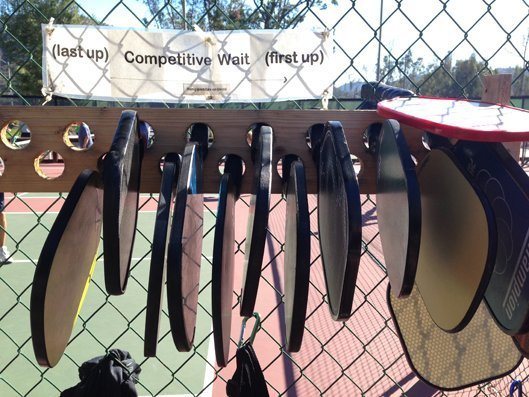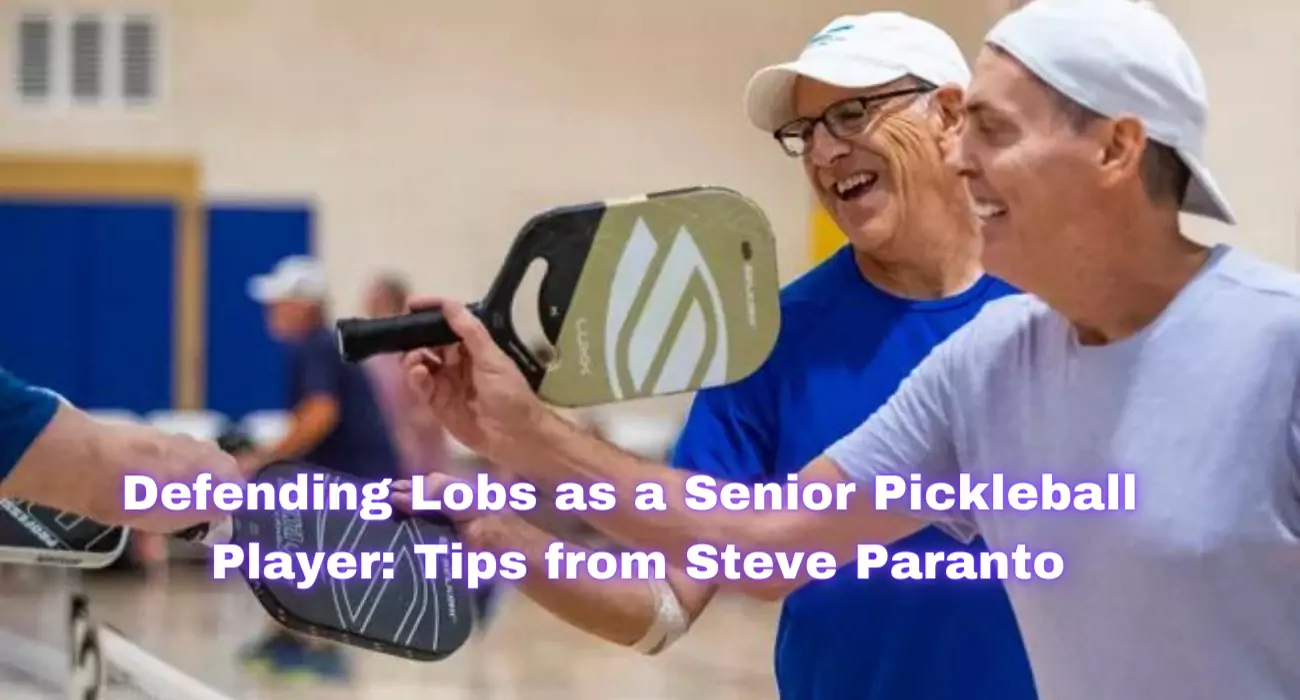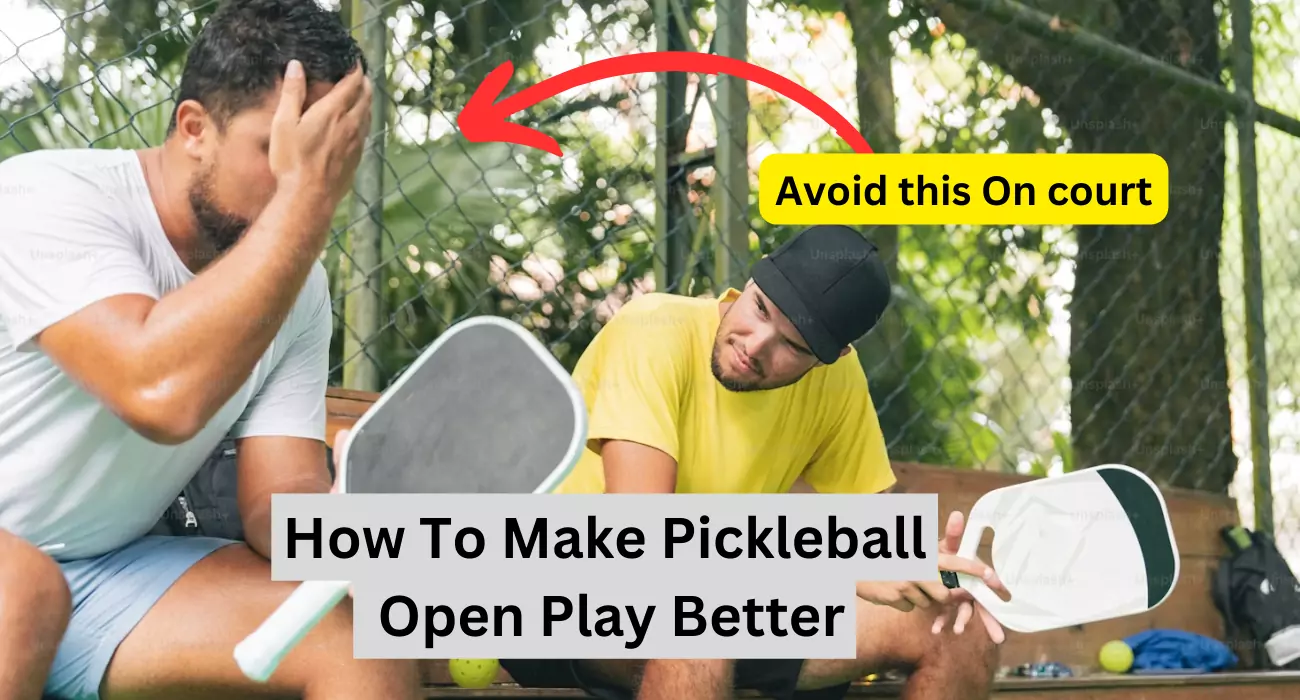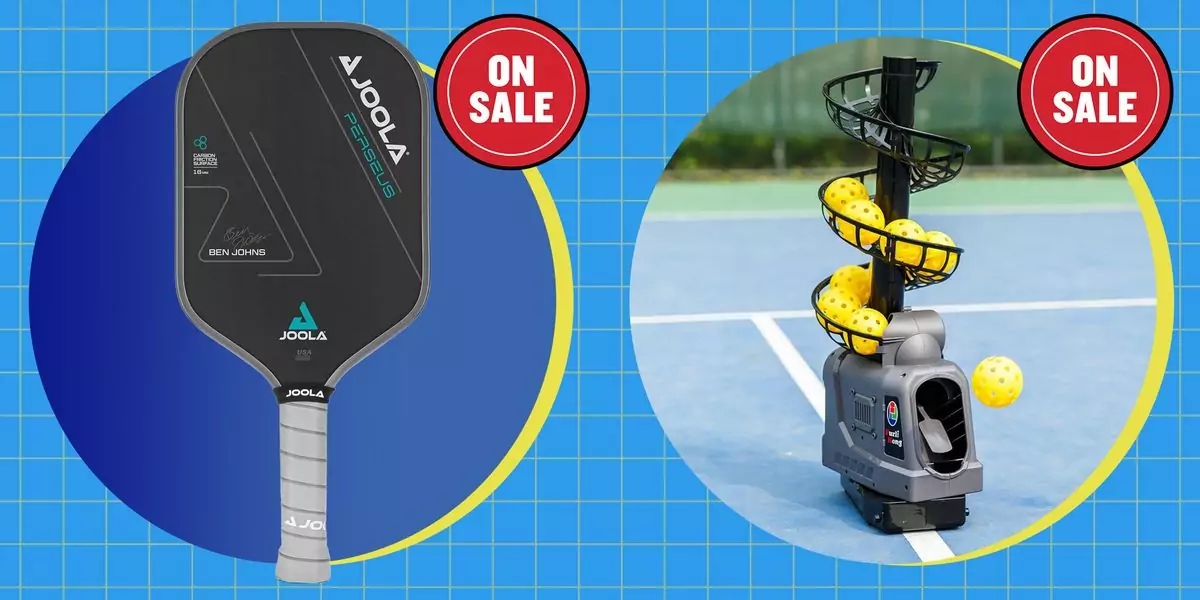If you go to a busy park or public pickleball court in the morning, noon, or evening, you will most likely see an array of paddles lined up across a chain-link fence and people waiting patiently for their turn to get onto a pickleball court. This is open play pickleball.
What is open play?
Open play in pickleball is when people come together to take turns playing games on the courts. It’s like a gathering where players can have fun and play against each other. Sometimes, it’s also called recreational play or paddle stack. But no matter what you call it, it’s just a friendly way for pickleball lovers to enjoy the game together.

Open play nearly always includes a queue or line system. Players will either stack their paddles (known as a “paddle stack”) or line them up across a slotted rack into which they will slide.
The problems with open play
Open play, for all its social aspects and accessibility, can be a bit of a wild card in pickleball. Here are some of the common issues you might encounter:pen_spark
- Disorganization
- Skill disparity
- Security concerns
Open play is disorganized
“Organizing is a journey, not a destination,” a saying applies to open play in various activities, including pickleball. The dynamic nature of open play often results in inconsistent experiences, oscillating between seamless and chaotic. This inconsistency can be attributed to lacking a designated leader or coordinator, which leaves community members to self-organize.
While some individuals may attempt to guide or direct the play, their absence or disregard by others can hinder the process. This leadership vacuum can lead to confusion, with some players cutting in line or disregarding the queue, potentially sparking conflicts. Effective organization and clear communication are essential to ensure a smooth and enjoyable experience for all participants.
Solution: Nominate group leaders
Every group has its core members, who often naturally assume leadership roles. However, relying solely on one or two individuals to manage everything is unreasonable.
Instead of dictating or demanding, leadership in this context means setting a positive example, providing guidance when needed, and gently reminding others to adhere to the group’s rules, which benefits everyone.
If you’re not interested in being a leader, you can still contribute by supporting and appreciating those who take on these responsibilities. Express your gratitude for their efforts, offer constructive feedback when necessary, and help foster a collaborative environment where everyone can thrive.
Skill disparity
Experienced pickleball players often acknowledge that playing with beginners or lower-level players can be a welcome occasional experience, recognizing that they once started from scratch. However, consistently playing non-competitive games can become frustrating.
This sentiment applies to players of all skill levels, not just higher-skilled players avoiding lower-skilled opponents. The psychological concept of the “zone of proximal development” (ZPD) suggests optimal learning occurs when faced with challenges beyond our current abilities.
A 3.5-level player benefits most from competing against someone slightly above or below their level in pickleball. Otherwise, games may become too challenging or too easy, hindering growth.
Open play’s inclusive nature allows anyone to participate at any time, leading to unpredictable matchups. Beginners might face off against 4.0 players, while 4.0 players might encounter semi-pros, highlighting the need for adaptable and supportive play.
Solution A: Dedicate one court to higher-level play
Implementing a solution to balance play can be challenging but worth exploring. If your group can access multiple courts, design one for higher-level players. This raises the question: what defines a higher level?
One approach is to use DUPR scores or self-assessment, which can be tricky as some players may overestimate their abilities or want to play with more advanced players, leading to unbalanced play. When this occurs, kindly inform the player they’re not yet ready for that court, but they’re welcome to return when they’ve improved.
This approach may initially cause issues, but consistency and clear communication can help the group understand and adapt. If dedicating a whole court to a small group of advanced players isn’t feasible due to the group’s size, consider allowing them to play among themselves within the larger rotation. While this may seem like preferential treatment, playing against significantly more skilled players won’t benefit your growth.
By implementing these measures, you can create a more balanced and enjoyable experience for all players, acknowledging the diverse skill levels within your group.
Solution B: Use baskets instead of a rack
Instead of using a rack, consider employing a basket system labeled with different skill levels to organize players. For example, mark baskets with 3.0, 3.5, 4.0+ (self-assessed), and 4.0+ (DUPR). For smaller groups, label them “Beginner,” “Intermediate,” or “Advanced.”
When a basket is full, the four players take the court. This system enables players to self-regulate and find their optimal challenge level while distinguishing between self-assessed and verified higher-level players.
Solution C: Be encouraging but firm
When informing someone they’re not yet suited for a particular level of play, it’s essential to approach the situation with empathy and tact. Avoid discourteous behavior like making faces, ignoring them, or displaying frustration through heavy sighs.
Instead, adopt a constructive and supportive approach. Gently explain that their skills aren’t quite at the required level while still acknowledging their potential. Be firm yet encouraging; most players will appreciate your honesty and consistency.
Some individuals may react negatively, but as long as you’ve communicated respectfully, you’ve fulfilled your responsibility to the group. By doing so, you’ve helped maintain a positive and inclusive environment for all players.
Security concerns
Leaving your belongings unattended while you play can be a worry. Social norms serve as the primary governing force in a large group of unregulated individuals. Unfortunately, not everyone follows these guidelines. Some people take advantage of opportunities to steal. While this may not be a widespread issue for most people, it occurs occasionally.
Solution: Designate an area for personal belongings
To protect yourself from theft in open play pickleball:
- Designate a communal area for belongings, keeping them in plain sight.
- Keep bags and purses zipped and secure.
- Label your paddle with your name, not just a colored grip.
- Take valuables like wallets, keys, and phones with you to the court and place them out of bounds.
- If you witness something suspicious, speak up! Consider how you’d feel if your belongings were stolen and appreciate others’ vigilance.
By being a responsible and considerate community member, we can address many issues in open-play pickleball. Let’s look out for each other.
-
The Small-Town Kid Who Became a Pickleball Superstar! Dylan Frazier’s Inspiring Story

Dylan Frazier: A Pickleball Prodigy’s Rise to the Top Dylan…
-
Club tennis ‘endangered’ as other racket sports grow, Novak Djokovic warns

Following his Centre Court victory at Wimbledon 2024, tennis star…
-
Pickleball points: Here are some tips and strategies specifically for seniors

As a senior pickleball player, it’s important to be mindful…
-
Pickleball Paddles Market Research Report: Current Scenario and Future Prospects -2032

Pickleball Paddles Market Research Report Highlights The pickleball paddles market…
-
USA Pickleball Creates 2024 USA Pickleball Select Series

Five regional round-robin competitions will take place across the country…
-
Haworth takes out Staksrud to win his first PPA title

Haworth Claims Maiden PPA Tour Gold Medal Chris Haworth made…
-
Waters and Johns dominate mixed doubles final

Mixed Doubles Gold Medal Won by Anna Leigh Waters and…
-
Johnson, Frazier strike gold in San Clemente as Frazier takes over No. 1 ranking

Johnson and Frazier Claim Men’s Doubles Title JW Johnson and…



